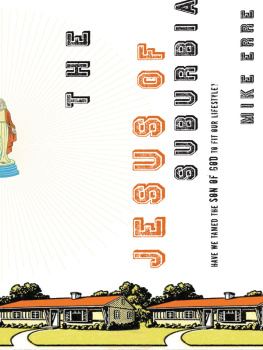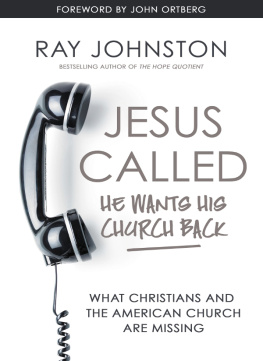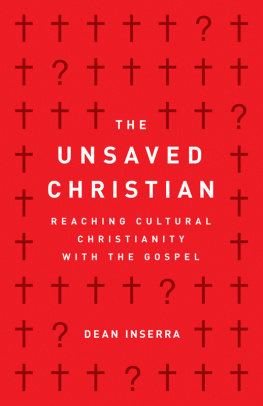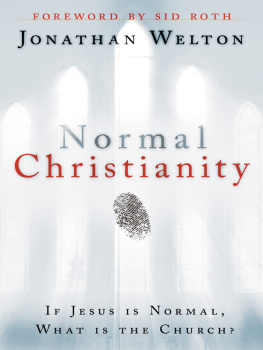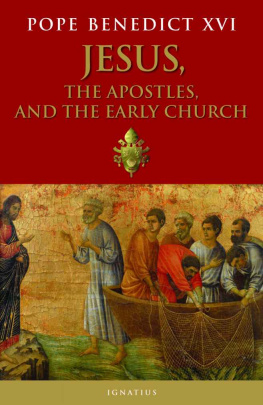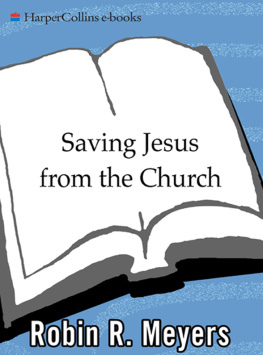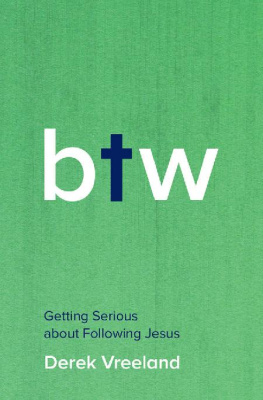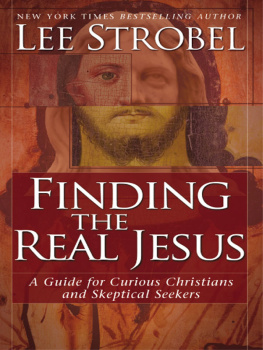THE JESUS OF
SUBURBIA
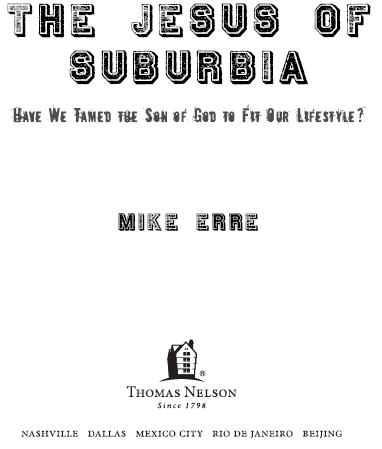
THE JESUS OF SUBURBIA
2006 Mike Erre
All rights reserved. No portion of this book may be reproduced, stored in a retrieval system, or transmitted in any form or by any meanselectronic, mechanical, photocopy, recording, scanning, or otherexcept for brief quotations in critical reviews or articles, without the prior written permission of the publisher.
Published in Nashville, Tennessee, by Thomas Nelson. Thomas Nelson is a registered trademark of Thomas Nelson, Inc.
Thomas Nelson, Inc., titles may be purchased in bulk for educational, business, fund-raising, or sales promotional use. For information, please e-mail SpecialMarkets@ThomasNelson.com.
All Scripture quotations, unless otherwise indicated, are taken from The Holy Bible, New International Version (NIV). 1973, 1978, 1984. International Bible Society. Used by permission of Zondervan Bible Publishers..
Editorial Staff: Greg Daniel, acquisitions editor, and Thom Chittom, managing editor
Cover Design: Gearbox Design
Page Design: Walter Petrie
Library of Congress Cataloging-in-Publication Data
Erre, Mike, 1971
The Jesus of suburbia / Mike Erre.
p. cm.
Includes bibliographical references and index.
ISBN 978-0-8499-0059-4
1. Christian life. I. Title.
BV4501.3.E73 2006
248.4dc22
2006012968
Printed in the United States of America
08 09 10 11 12 QW 7 6 5 4 3
This book is dedicated to my wife, Justina:
Like a lily among thorns is my darling
among the maidens (Song of Songs 2:2).
You are Gods blessing to me.
CONTENTS
This book has been formed in a community of many men and women who help inspire and sharpen. Thank you to:
Bruce and Stanfor dreaming up Isaachar and
inviting me along for the ride
Greg Danielfor taking a risk on me and for much
helpful critique
Mark Sweeneyfor believing in me and this book
Todd Proctorfor the joy of going to war with you,
time and again
Chad Halliburton, Pete Shambrook, and Nick
Taylorfor walking with me in dark places
The Elders, Staff, and Revolutionaries of Rock
Harbor Churchfor allowing me the freedom to
learn, stumble, and grow in front of you
Donna Wellsfor your tireless care and diligence
Krysti Hallfor some fantastic, last-minute spit and
polish
My folksfor much love and support
Nathaniel and Hannah Errefor teaching me more
about Gods love than I could have imagined
Erwin McManus, Rich Nathan, Rob Bell, Kenton
Beshore, Dallas Willard, Bart Tarman, JP
Morelandmentors far and near whose thinking
has dramatically shaped my own. I have learned to
see Jesus more clearly through your work, and I
hope Ive given you enough credit in this book.
Your ideas have stayed with me for so long that
Ive given up the temptation to think that Ive ever
had an original thought.
I absolutely love Jesus Christ. I dont think he is a figment or a crutch or some religious hangover. I think he is real and alive and wonderfully engaged in the world today. But I have serious problems with the religion that bears his name. As a pastor, I have been a follower of Christ as well as a follower of Christianity. And I cant help but notice there is a growing difference between the two. (Maybe that difference has always been there and Ive just never seen it until now. Maybe each new generation must come to grips with this difference, as the church grows increasingly removed from its founder.)
I am also a big fan of the Bible. I love that it is raw, inspiring, convicting, living, and terrifying all at the same time. I love that it is honest. I find it fascinating that, in the second chapter of Luke, we read about Jesuss parents returning home from a Passover feast in Jerusalemwithout him! They left him behind in the city and walked an entire day without noticing that he was missing. When he didnt turn up, the Bible says, they became worried and started looking for him. No kidding. Theyd just misplaced the Savior of the world!
To be fair to Mary and Joseph, in those days people traveled in large groups for protection... but still.
And so for a while, anyway, Jesuss parents lost the Messiah. Unknowingly, they had moved on without him. Once they realized this, they spent the next three days looking for him, only to find him back in the temple (where, Jesus implied, they should have known they would find him all along).
This story brings to mind much of modern American Christianity. It seems in many ways we are like Jesuss parents on the road to Jerusalem: we think he is with us, but weve moved on without him. We preach Christianity, but do we really preach Christ? We call people to serve the church, but do we call them to serve the poor? We teach them to know sound doctrine, but do we teach people to center their whole lives (and not just their intellectual knowledge) on him? Do we teach people to have a commitment to the Bible or to a relationship with its author?
I think we may have lost sight of Jesus among all the trappings of the Christian religion. Amid all the hype about the growing political power of evangelicals, the growing numbers of mega-churches, and the booming, billion-dollar Christian subculture industry, I wonder if we have left Jesus behind. Or, worse, if he has left us behind. Either way, I think the story in Luke 2 is a fitting picture of where we find ourselves with Christianity today in the West.
I am not alone in noticing this. Growing numbers of people are awakening to the same thought Mary and Joseph must have had: weve lost Jesus, and we need to begin searching for him.
Without question, Jesus can still be found in [his] fathers house, the church. Hes just not so easy to spot these days. We cower behind our fortress of absolute truth, arrogantly pronouncing judgment on the world around us, condemning sin and sinner alike. Dare we consider the possibility that Jesus might be preaching a different message, to a different audience, in a different way than the message we have embraced as the American church? Like Mary and Joseph recognized, it is time to become worried and to begin searching for him.
The search begins with tough questions. Do we as Western Christians reflect Jesus or obscure him? Can we say that we, his church, teach what he taught, love what (and whom) he loved, and hate what he hated? Are his priorities really ours?
My primary contention is this: Much of what passes for modern, western Christianity isnt of Jesus. We can (and do) lose Jesus right in the middle of prayer meetings and worship services. We can miss him in the Bible and in the church. As the Scriptures remind us, not all worship is pleasing to God, not all church services are attended by Jesus, not all teaching is sound teaching, and not all prayer is in Jesuss name.
Why is it that:
Study after study shows no statistical difference between the behaviors of those inside the church and those outside it?
So many Christians have adopted a victim mentality with an attitude of helplessness and have put much of our hope and trust in the political process and court system, implying that Gods work on earth depends upon who sits in the White House?
We currently see very little of the power, vitality, and growth today in our hearts and churches that once characterized the explosive movement of God?
Is it because we have substituted human traditions for the teachings of God? Have we made our Jesus the Jesus of Christianity, not the Jesus of the Gospels? We may think we worship the Jesus of Nazareth, but in reality we worship the Jesus of Suburbia.
Next page
